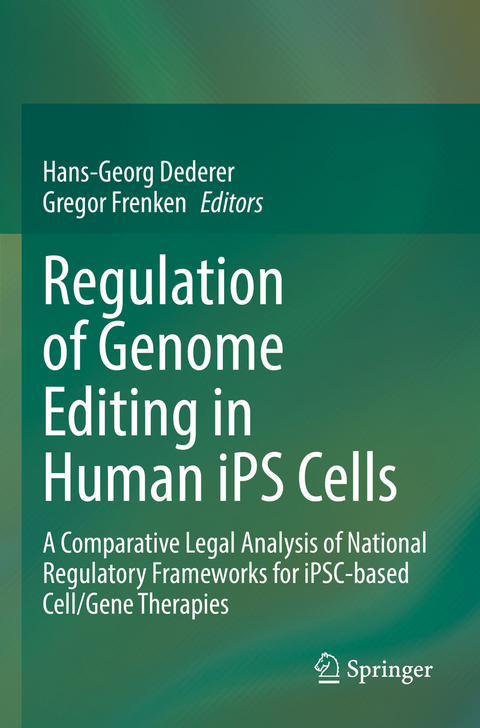
Regulation of Genome Editing in Human iPS Cells
Springer International Publishing (Verlag)
978-3-030-93025-7 (ISBN)
lt;p>Hans-Georg Dederer is a full professor and holder of the Chair of Constitutional and Administrative Law, Public International Law, European and International Economic Law at the University of Passau (Germany). His fields of research include biotechnology law. He is also a member of the Permanent Senate Commission on Genetic Research of the German Research Foundation (Deutsche Forschungsgemeinschaft - DFG).
Gregor Frenken is a teaching and research assistant in the Chair of Constitutional and Administrative Law, Public International Law, European and International Economic Law at the University of Passau (Germany).
Introduction.- Biological Aspects of Genome Editing in iPS Cells.- Ethical Aspects in the Context of Genome Editing.- Regulation of Genome Editing in iPS Cells: Germany.- Regulation of Genome Editing in iPS Cells: France.- Regulation of Genome Editing in iPS Cells: Switzerland.- Regulation of Genome Editing in iPS Cells: United States.- Regulation of Genome Editing in iPS Cells: Japan.- Regulation of Genome Editing in iPS Cells: Republic of Korea.- Comparative Analysis.
| Erscheinungsdatum | 26.05.2023 |
|---|---|
| Zusatzinfo | X, 334 p. 13 illus., 10 illus. in color. |
| Verlagsort | Cham |
| Sprache | englisch |
| Maße | 155 x 235 mm |
| Gewicht | 528 g |
| Themenwelt | Studium ► 2. Studienabschnitt (Klinik) ► Humangenetik |
| Recht / Steuern ► Allgemeines / Lexika | |
| Recht / Steuern ► EU / Internationales Recht | |
| Schlagworte | atmp • ATMP regulation • Cell Therapy • gene therapy • Genome-edited iPS cells • Germline genome editing • Germline Therapy • Human genome editing • iPS cells • Somatic genome editing |
| ISBN-10 | 3-030-93025-4 / 3030930254 |
| ISBN-13 | 978-3-030-93025-7 / 9783030930257 |
| Zustand | Neuware |
| Informationen gemäß Produktsicherheitsverordnung (GPSR) | |
| Haben Sie eine Frage zum Produkt? |
aus dem Bereich


